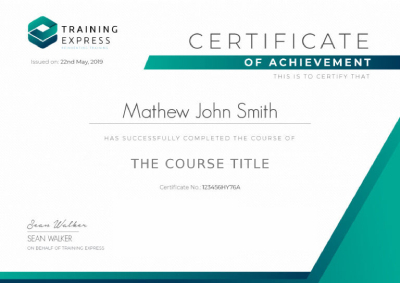GET THIS COURSE AND 1500+ OTHERS FOR ONLY £49 PER YEAR. FIND OUT MORE
The Electric Circuits for Electrical Engineering course teaches you everything on the topic thoroughly from scratch so you can achieve a professional certificate for free to showcase your achievement in professional life. This Electric Circuits for Electrical Engineering training is a comprehensive, instructor-guided course, designed to provide a detailed understanding of the nature of the related sector and your key roles within it.
To become successful in your profession, you must have a specific set of skills to succeed in today’s competitive world. In this in-depth training course, you will develop the most in-demand skills to kickstart your career, as well as upgrade your existing knowledge & skills.
The training materials of this Electric Circuits & Electrical Engineering course are available online for you to learn at your own pace and fast-track your career with ease.
Our trusted, high quality and affordable Electric Circuits for Electrical Engineering training course trains individuals to become experts in their field.
- Accredited by CPD
- Instant e-certificate and hard copy dispatch by next working day
- Fully online, interactive course with audio voiceover
- Developed by qualified professionals in the field
- Self-paced learning and laptop, tablet, smartphone-friendly
- 24/7 Learning Assistance
- Discounts on bulk purchases
Sneak Peek Of Electric Circuits for Electrical Engineering Course
Who Should Take The Electric Circuits for Electrical Engineering Course
Anyone with a knack for learning new skills can take this Electric Circuits for Electrical Engineering training. While this comprehensive training is popular for preparing people for job opportunities in the relevant fields, it also helps to advance your career for promotions.
Certification
Once you’ve successfully completed your course, you will immediately be sent a digital certificate. Also, you can have your printed certificate delivered by post (shipping cost £3.99). All of our courses are fully accredited, providing you with up-to-date skills and knowledge and helping you to become more competent and effective in your chosen field. Our certifications have no expiry dates, although we do recommend that you renew them every 12 months.

Accreditation
All of our courses, including this Electric Circuits for Electrical Engineering course, are fully accredited, providing you with up-to-date skills and knowledge and helping you to become more competent and effective in your chosen field.
Assessment
At the end of the course, there will be an online assessment, which you will need to pass to complete the course. Answers are marked instantly and automatically, allowing you to know straight away whether you have passed. If you haven’t, there’s no limit on the number of times you can take the final exam. All this is included in the one-time fee you paid for the course itself.
Course Curriculum
- Module 1- What Is an Electric Circuit
- Module 2-System of Units
- Module 3- What Is an Electric Charge
- Module 4- What Is an Electric Current
- Module 5-Example 1
- Module 6- Example 2
- Module 7- Example 3
- Module 8- What Is Voltage
- Module 9- What Is Power
- Module 10- What Is Energy
- Module 11- Example 4
- Module 12- Example 5
- Module 13- Dependent and Independent Sources
- Module 14- Example 6 Part 1
- Module 15- Example 6 Part 2
- Module 16- Application 1 Cathode Ray Tube
- Module 17-Example 7
- Module 18- Application 2 Electricity Bills
- Module 19- Example 8
- Module 1- Introduction to Basic Laws
- Module 2- Definition of Resistance
- Module 3- Ohm’s Law
- Module 4- Types of Resistances
- Module 5- Open and Short Circuit
- Module 6- Definition of Conductance
- Module 7- Example 1
- Module 8- Example 2
- Module 9-Example 3
- Module 10- Branch, Node and Loops
- Module 11- Series and Parallel Connection
- Module 12- KCL
- Module 13- KVL
- Module 14- Example 4
- Module 15- Example 5
- Module 16- Example 6
- Module 17- Series Resistors and Voltage Division
- Module 18-Parallel Resistors and Current Division
- Module 19- Analogy between Resistance and Conductance
- Module 20-Example 7
- Module 21-Example 8
- Module 22- Introduction to Delta-Wye Connection
- Module 23-Delta to Wye Transformation
- Module 24- Wye to Delta Transformation
- Module 25-Example 9
- Module 26- Example 10
- Module 27- Application Lighting Bulbs
- Module 28-Example 11
- Module 1- Introduction to Methods of Analysis
- Module 2- Nodal Analysis with No Voltage Source
- Module 3-Example 1
- Module 4-Cramer’s Method
- Module 5-Nodal Analysis with Voltage Source
- Module 6- Example 2
- Module 7- Example 3
- Module 8-Mesh Analysis with No Current Source
- Module 9-Example 4
- Module 10- Example 5
- Module 11-Mesh Analysis with Current Source
- Module 12-Example 6
- Module 13-Nodal Vs Mesh Analysis
- Module 14-Application DC Transistor
- Module 15-Example 7
- Module 1-Introduction to Circuit theorems
- Module 2-Linearity of Circuit
- Module 3- Example 1
- Module 4-Superposition Theorem
- Module 5- Example 2
- Module 6-Example 3
- Module 7-Source Transformation
- Module 8-Example 4
- Module 9-Example 5
- Module 10-Thevenin Theorem
- Module 11-Example 6
- Module 12-Example 7
- Module 13- Norton’s Theorem
- Module 14-Example 8
- Module 15-Example 9
- Module 16-Maximum Power Transfer
- Module 17-Example 10
- Module 18-Resistance Measurement
- Module 19-Example 11
- Module 20-Example 12
- Module 21-Summary
- Module 1-Introduction to Operational Amplifiers
- Module 2-Construction of Operational Amplifiers
- Module 3-Equivalent Circuit of non Ideal Op Amp
- Module 4-Vo Vs Vd Relation Curve
- Module 5-Example 1
- Module 6-Ideal Op Amp
- Module 7- Example 2
- Module 8-Inverting Amplifier
- Module 9-Example 3
- Module 10-Example 4
- Module 11-Non Inverting Amplifier
- Module 12-Example 5
- Module 13-Summing Amplifier
- Module 14-Example 6
- Module 14-Example 6
- Module 15-Difference amplifier
- Module 16-Example 7
- Module 17-Cascaded Op Amp Circuits
- Module 18-Example 8
- Module 19-Application Digital to Analog Converter
- Module 20-Example 9
- Module 21-Instrumentation Amplifiers
- Module 22-Example 10
- Module 23-Summary
- Module 1-Introduction to Capacitors and Inductors
- Module 2-Capacitor
- Module 3-Capacitance
- Module 4-Voltage-Current Relation in Capacitor
- Module 5-Energy Stored in Capacitor
- Module 6-DC Voltage and Practical Capacitor
- Module 7- Example 1
- Module 8- Example 2
- Module 9- Example 3
- Module 10-Equivalent Capacitance of Parallel Capacitors
- Module 11-Equivalent Capacitance of Series Capacitors
- Module 12-Example 4
- Module 13-Definition of Inductors
- Module 14-Definition of Inductance
- Module 15-Voltage-Current Relation in Inductor
- Module 16-Power and Energy Stored in Inductor
- Module 17-DC Source and Inductor
- Module 18-Example 5
- Module 19-Series Inductors
- Module 20-Parallel Inductors
- Module 21-Example 6
- Module 22-Small Summary to 3 Basic Elements
- Module 23-Example 7
- Module 24-Application Integrator
- Module 25-Example 8
- Module 26-Application Differentiator
- Module 27-Example 9
- Module 28-Summary
Course Curriculum
Course Ratings
4.8
- 5 stars0
- 4 stars0
- 3 stars0
- 2 stars0
- 1 stars0
No Ratings found for this course.
 TAKE THIS COURSE
TAKE THIS COURSE
£125.00£20.00 ex VAT- 1 year
- Intermediate
- Course Certificate
- 10 hours, 26 minutes Gift this course
Subscribe to this course and 2,000+ top‑rated Training Express courses for your organization.
Try Training Express Business- For teams of 5 or more users
- 2,000+ fresh & in-demand courses
- Learning Engagement tools
- SSO and LMS Integrations
 Food Hygiene
Food Hygiene Health & Safety
Health & Safety Safeguarding
Safeguarding First Aid
First Aid Business Skills
Business Skills Personal Development
Personal Development









